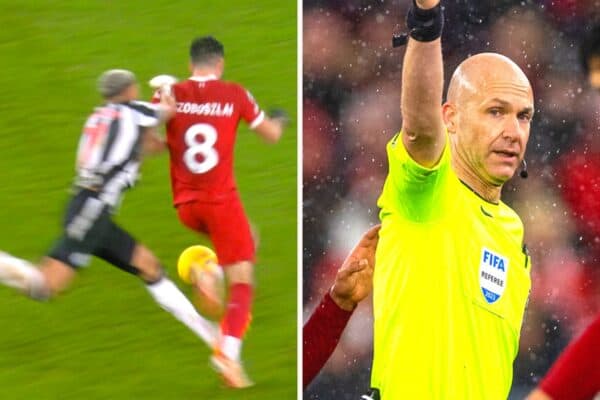A blatant foul stopping the progress of an attack typically results in a yellow card, but that was not the case for Newcastle‘s Joelinton at Anfield, and the explanation why is baffling.
Jurgen Klopp‘s side were a dominant force against the Magpies, and the visitors subsequently threw their toys out of the pram and resorted to some questionable challenges.
In the first half, when scores remained 0-0, Dominik Szoboszlai was on the attack and ventured into Newcastle‘s half, and Joelinton unceremoniously grabbed and pulled the midfielder’s shoulder.
Liverpool’s No. 8 went to ground and as Liverpool awaited the whistle, referee Anthony Taylor signalled for the game to continue, playing advantage with the Reds now into the final third.
One can praise the official for wanting to keep the game moving, but once that passage of play finished more than a minute later, there was no yellow card brandished in Joelinton’s direction.
Anfield erupted and Mohamed Salah quickly rushed to Taylor’s side to plead Liverpool’s case after the ball went out for a Newcastle corner.
Now, the PGMOL (Professional Game Match Officials Limited) have offered up an explanation over why there was no booking for Newcastle‘s No. 7.
As relayed by The Times‘ Henry Winter, Taylor did not go back to show a yellow as the “holding offence in the first half (that) interfered with a promising attack and advantage was played, therefore no caution.”
It comes under Law 12 section three, which states: “If the referee plays the advantage for an offence for which a caution/sending-off would have been issued had play been stopped, this caution/sending-off must be issued when the ball is next out of play.
PGMOL seek to clarify why Taylor didn’t go back and book Joelinton for “holding offence in the first half (that) interfered with a promising attack and advantage was played, therefore no caution” as ? #LIVNEW pic.twitter.com/2k1yOTBbfU
— Henry Winter (@henrywinter) January 2, 2024
“However, if the offence was denying the opposing team an obvious goal-scoring opportunity, the player is cautioned for unsporting behaviour; if the offence was interfering with or stopping a promising attack, the player is not cautioned.”
The rules are the rules, but it is not always interpreted this way, and you can understand the obvious frustration over the lack of consistency.
A team will likely want a caution shown to the opposition rather than a half chance from an advantage, especially when it was only in the 66th minute that Joelinton finally received a yellow card.

















Fan Comments